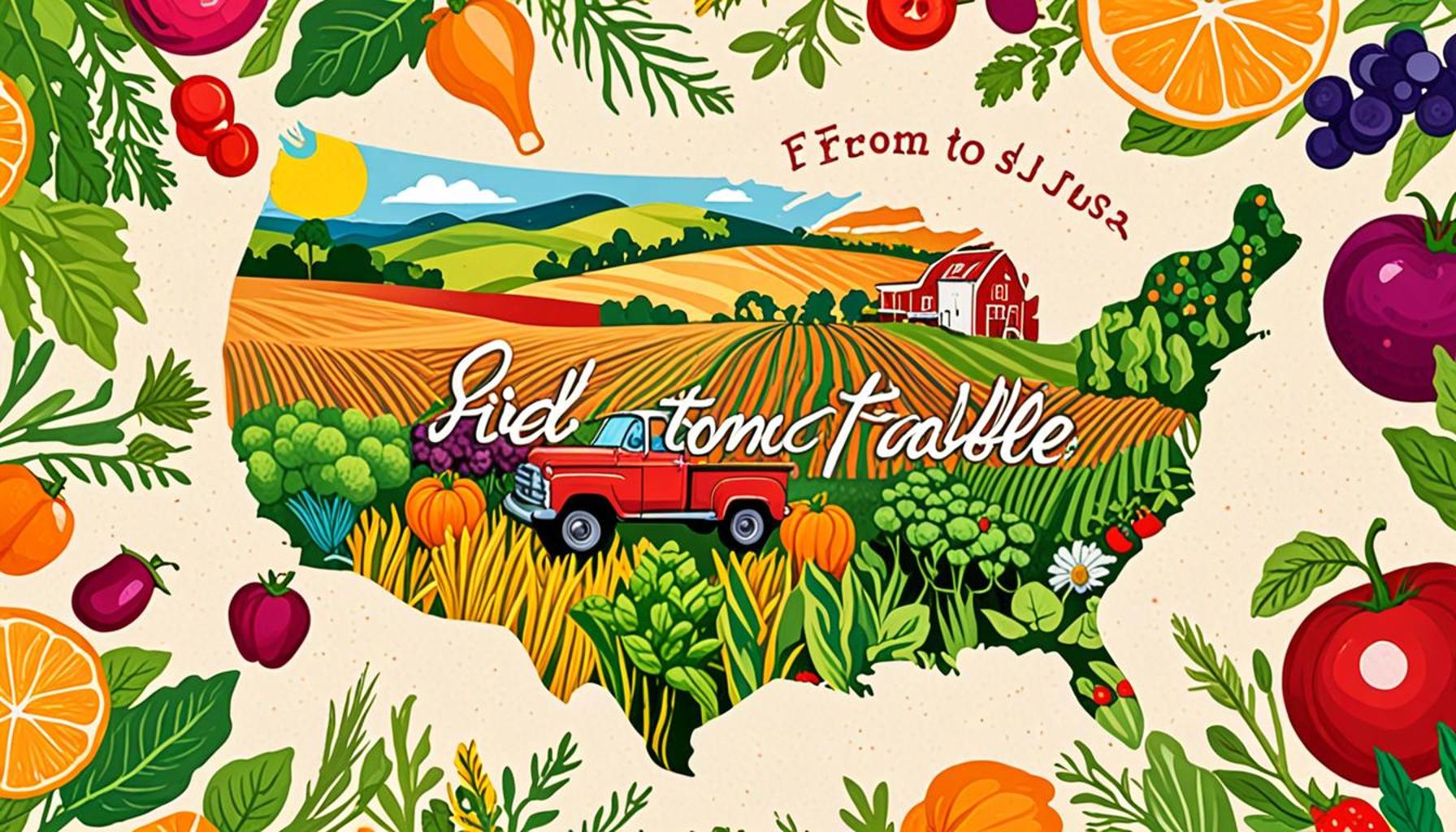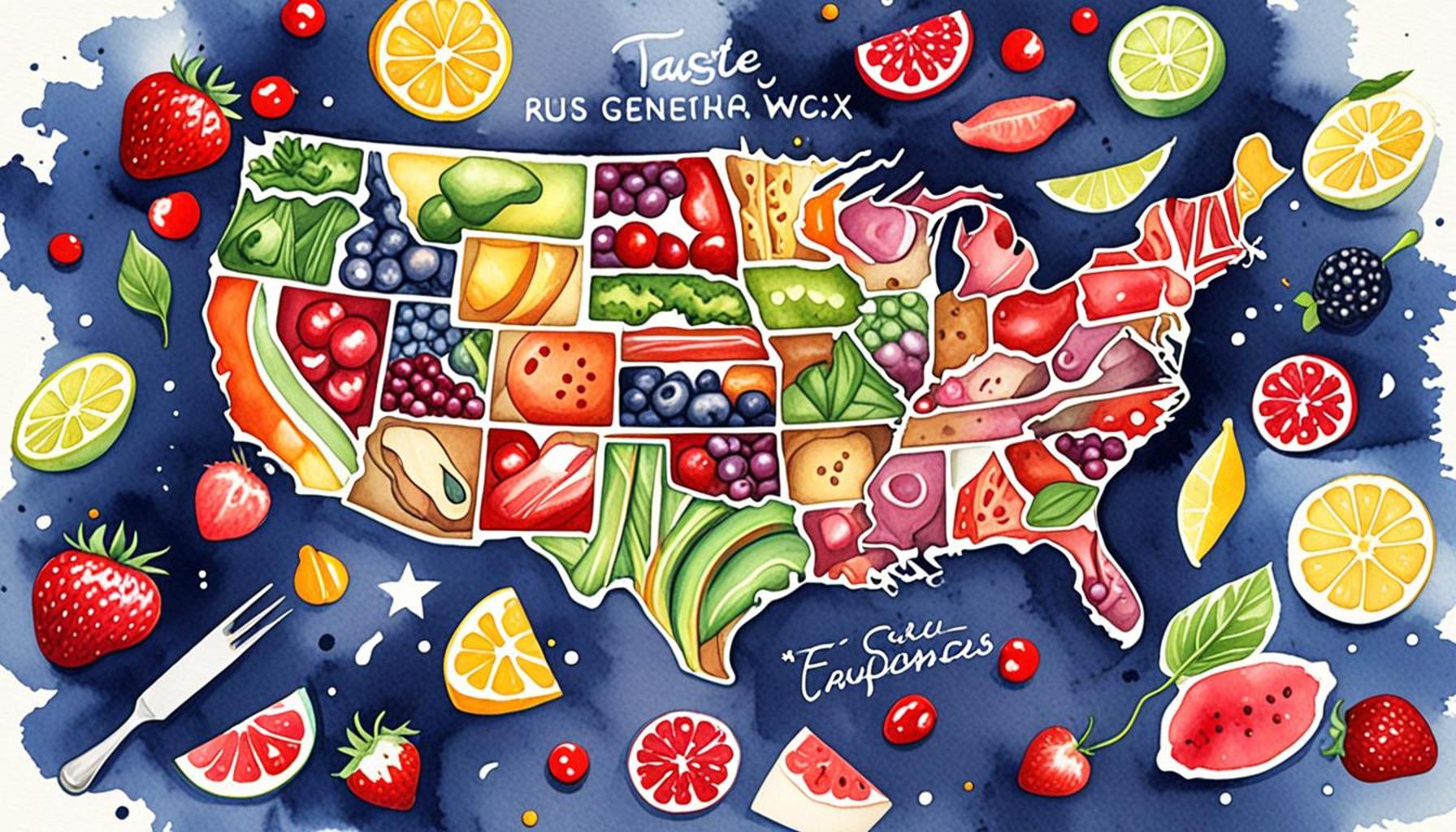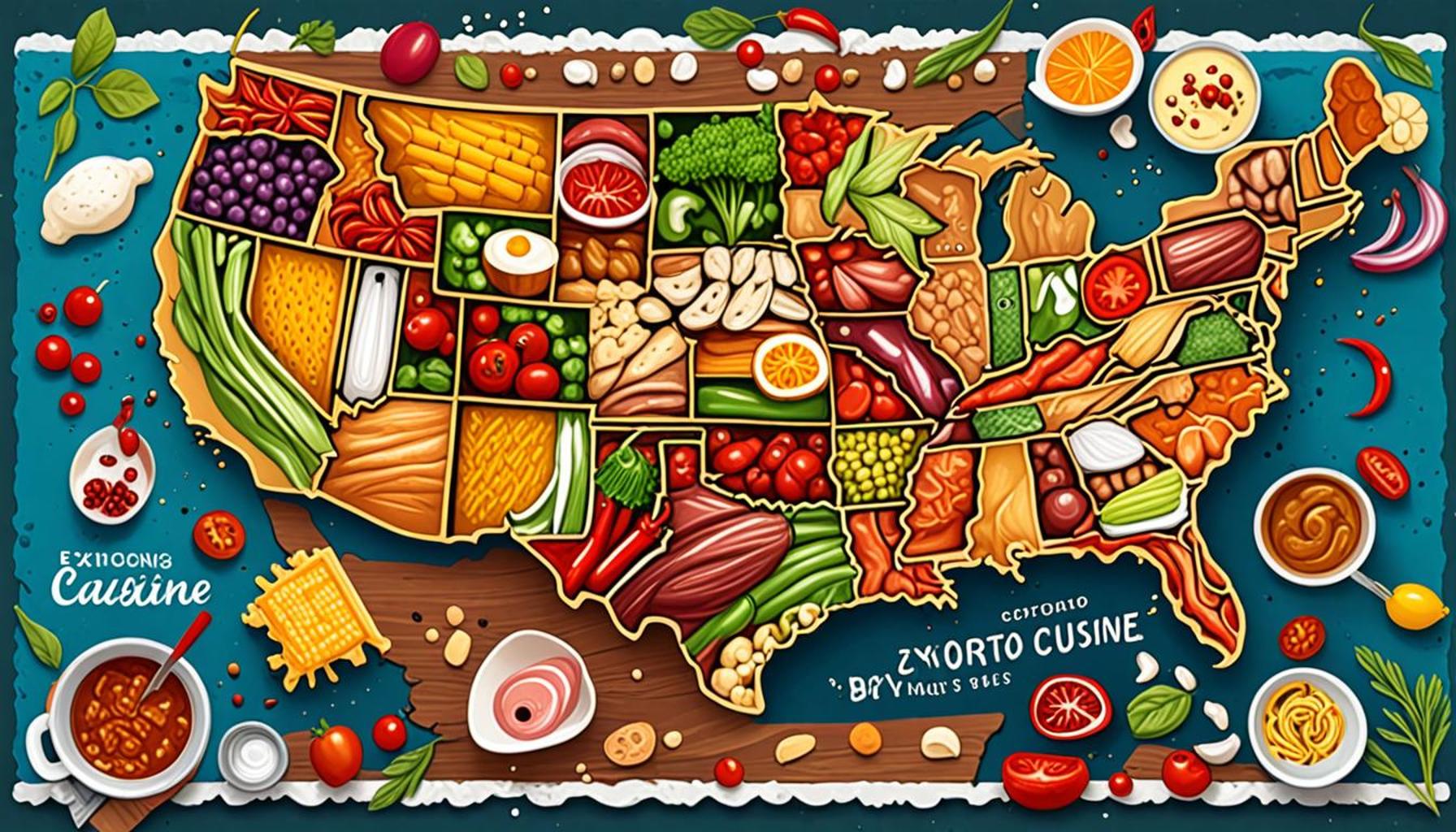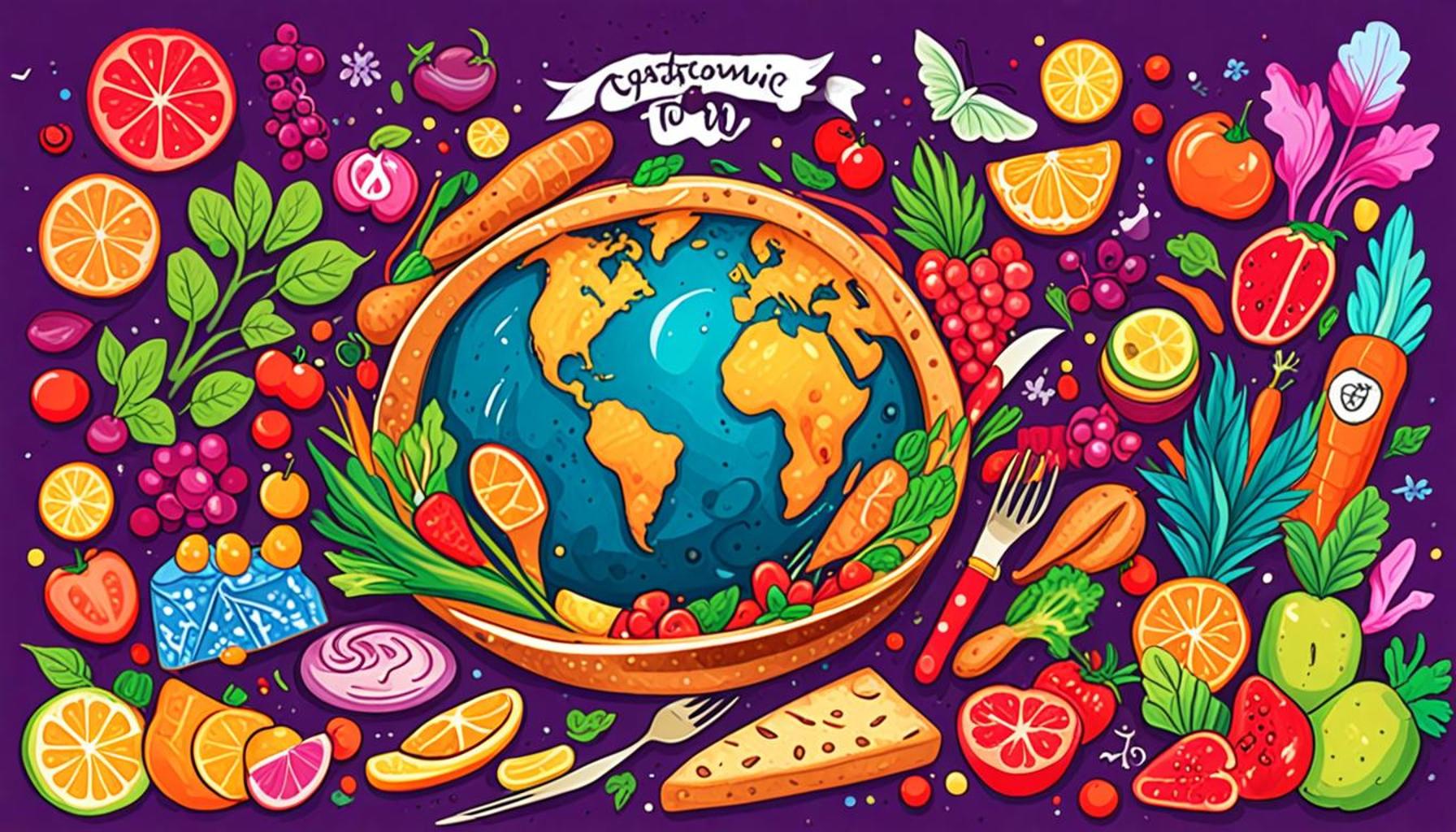From Farm to Table: Sustainable Culinary Tours and Local Agriculture in the USA

Discover the Journey of Ingredients
In an era where food transcends mere sustenance, it acts as a bridge to connect us with our surroundings and the communities we belong to. Sustainable culinary tours across the United States highlight the intricate stories behind our meals, fostering a deep connection to local agriculture and the land that produces our food.
These immersive experiences tantalize the taste buds while simultaneously educating participants on the significance of sustainable farming practices. As you embark on these unique culinary adventures, here’s a closer look at what awaits:
- Farm Visits: Step onto local farms and engage with passionate farmers who dedicate their lives to sustainable methods. These visits often include guided tours where you can learn about organic farming techniques, crop rotation, and the impact of climate change on agriculture. For instance, in Vermont, you might visit a dairy farm that practices rotational grazing, allowing cows to graze on fresh pasture, which not only benefits animal welfare but also nurtures the soil.
- Hands-On Cooking Classes: Dive into the culinary arts with classes led by local chefs who prioritize fresh, locally-sourced ingredients. Imagine chopping vibrant vegetables at a cooking workshop in the Pacific Northwest, where you learn to prepare a seasonal salad that highlights the freshest offerings of the region, such as heirloom tomatoes and artisanal cheeses.
- Seasonal Harvest Tours: Participate in harvest tours that immerse you in the cycles of food production. Experience the thrill of picking berries at a U-Pick farm in Michigan or gather fresh herbs from a community garden in New York. These hands-on experiences deepen your understanding of the labor and care that go into cultivating food and the importance of eating seasonally.
Regions such as California, the Midwest, and the Southern states display a rich agricultural tapestry, showcasing diverse crops and farming practices. For example, California’s Napa Valley is renowned not only for its vineyards but also for its commitment to organic and biodynamic farming. Meanwhile, Charleston’s vibrant farmers’ markets feature an array of locally grown produce, artisanal products, and the strong influence of Lowcountry cuisine, which celebrates the area’s agricultural heritage.
As you join the movement of supporting local agriculture, you uncover the incredible flavors that stem from the earth while contributing to a more sustainable food system. These tours are not merely about indulging in delicious meals; they aim to cultivate an awareness and appreciation for the origins of our nourishment. Are you ready to explore and taste the remarkable farm-to-table phenomenon that connects you to your food in a way you never imagined?
DON’T MISS: Click here to embark on a journey through America’s heritage with your kids

Savoring the Local Flavor
As consumers become more conscious of their food choices, the demand for transparency in food sourcing has surged. The concept of farm-to-table has evolved into a lifestyle that emphasizes the importance of local agriculture, prompting an array of sustainable culinary tours that showcase the best of what the land has to offer. These tours provide participants with a chance not only to enjoy exquisite meals but also to gain insight into the environmental, economic, and social dynamics of local food systems.
The U.S. is home to a mosaic of agricultural practices, each influenced by regional climates and cultural heritage. For instance, California exemplifies a hub of innovation in sustainable farming, with vineyards adopting practices like dry farming and integrated pest management to maintain soil health and biodiversity. Visitors to this Golden State region can partake in wine tastings accompanied by farm tours that illuminate the nuanced methods behind organic wine production while also enjoying perfectly paired dishes crafted from farm-fresh ingredients.
The Importance of Community Supported Agriculture
One vital aspect that culinary tours often highlight is the role of Community Supported Agriculture (CSA). CSAs connect consumers directly with local farmers, allowing members to subscribe to regular deliveries of seasonal produce. Engaging with CSA programs not only supports local economies but also grants insights into the agricultural cycle, fostering a greater appreciation for food seasonality. Many culinary tours incorporate trips to local CSA operations, where participants can witness the operations firsthand and understand the efforts that go into producing quality food.
Exploration of Regional Cuisines
- The Pacific Northwest: Famed for its coastal biodiversity, this region offers an abundance of seafood and foraged ingredients. Culinary tours here often feature sustainable harvesting practices that ensure fish populations remain healthy, promoting a balance between enjoyment and conservation.
- The Midwest: Renowned for its hearty grains and livestock, the Midwest serves up a culinary landscape steeped in tradition. Farm tours often include artisan bread-making demonstrations and farm-to-table dinners that celebrate midwestern farming legacies.
- The South: Known for its diverse agricultural output, from sweet potatoes to peaches, the Southern states highlight the cultural significance of food traditions. Visitors can engage in tours that feature local plantation-style cooking and community collaborations that elevate the region’s culinary art.
These immersive culinary journeys invite food lovers to connect with farmers, chefs, and the larger food ecosystem. By participating, travelers not only enjoy delightful meals but also become advocates for sustainable practices that respect the land and honor its bounty. Ultimately, engaging in these tours enriches knowledge and builds conscientious consumer habits, shaping a future where sustainability in agriculture flourishes.
| Advantages | Description |
|---|---|
| Farm-to-Table Freshness | Enjoy ingredients harvested directly from local farms, ensuring maximum freshness and flavor in every dish. |
| Support Local Economy | Participating in sustainable culinary tours contributes to the livelihood of local farmers and supports community businesses. |
| Environmental Benefits | Sustainable practices reduce carbon footprints, promoting eco-friendly farming and seasonal eating habits. |
| Culinary Education | Tours often include workshops that teach visitors about sustainable agriculture and cooking techniques. |
Exploring “From Farm to Table: Sustainable Culinary Tours and Local Agriculture in the USA” transcends the conventional dining experience. It represents a movement that connects people with their food sources while instilling an appreciation for culinary traditions and agricultural practices. Embracing farm-to-table concepts nurtures not only our palates but also promotes health awareness about what we consume. Sustainability in agriculture is echoed through these tours, which offer participants a hands-on approach to understanding the benefits of local ingredients. As consumer demand for transparency regarding food origins grows, engaging with tours that highlight exceptional local farms cultivates a robust sense of community and accountability. The integration of farm experiences with culinary arts creates a unique bond, underscoring the importance of responsible sourcing. This not only enhances flavors but also fosters a connection with nature and cultivates respect for the hard work of local farmers. By immersing yourself in the sustainable culinary scene, you open doors to delightful tastes and innovative cooking methods—all while playing a role in responsible consumption.
DIVE DEEPER: Click here to uncover amazing adventures
Connecting with Nature and Generations
One of the hallmark features of sustainable culinary tours is the opportunity for participants to engage with local farmers. These interactions allow tourists to hear firsthand accounts of resilient farming practices passed down through generations. Farmers become storytellers, sharing not only their methodologies but also their passions and challenges faced in today’s food landscape. This enhances the experience, imbuing meals with not only flavors but also the rich tapestry of history and community behind them.
Innovative Farming Techniques
Beyond traditional age-old practices, modern agriculture is increasingly adopting innovative techniques that prioritize sustainability. For instance, many farms across the U.S. are implementing permaculture and regenerative agriculture practices that focus on improving soil health and increasing biodiversity. Tours through these farms often include hands-on workshops where participants can learn about composting, soil management, and the importance of biodiversity in food production. Understanding these principles fosters a deeper comprehension of the food system and agricultural sustainability.
Farm-to-Fork Dining Experiences
After a comprehensive farm tour, culinary tourism often culminates in a memorable farm-to-fork dining experience. Renowned chefs who are pioneers of the farm-to-table movement craft menus that celebrate the freshest ingredients from local farms. For instance, a tour in the New England region may end with a dinner highlighting local seafood, heirloom vegetables, and artisan cheeses, all paired with carefully selected local wines or craft beers. Such meals not only tantalize the palate but also create a connection between the diner and the land from which their food originates, reinforcing the impact of supporting local agriculture.
Raising Awareness Through Culinary Education
Integral to many sustainable culinary tours is the educational aspect. Workshops focused on food preservation techniques, such as canning, fermentation, and pickling, empower participants to take home their knowledge and practice sustainability in their daily cooking. This hands-on approach demystifies the process of preserving food, taking attendees beyond mere consumption into the realm of active participation in food culture. Such initiatives underscore the importance of understanding food origins, preparation, and the role of cooking in environmentally conscious living.
Supporting Local Communities
Another compelling reason to engage in sustainable culinary tours is their role in supporting local communities. By diverting tourist dollars into local farms and restaurants, these tours generate a profound economic impact. A report by the American Farmland Trust reveals that local food systems can generate up to four times more economic activity compared to traditional agricultural models. Culinary tours often shed light on community-driven initiatives, like co-ops and farmer’s markets, that strive to promote local food access and education. Participants leave not just with their bellies full but with an appreciation for local economies and their responsibility towards fostering sustainability.
As the farm-to-table movement continues to grow, it inspires a more profound understanding of our food systems, strengthens local economies, and fosters a deep connection to the land. A sustainable culinary tour transcends mere travel; it transforms the way individuals perceive food, agriculture, and their own consumption habits, all while highlighting the diverse offerings across the United States.
EXPLORE MORE: Click here to discover exciting trekking routes
Conclusion: Embracing Sustainable Culinary Journeys
In summary, sustainable culinary tours serve as a vital bridge between consumers and the rich traditions of local agriculture across the USA. By engaging directly with farmers, participants gain insights into the stories and challenges behind the food they eat, fostering an appreciation for sustainable practices that have been cultivated over generations. The embrace of innovative farming techniques like permaculture and regenerative agriculture not only promotes environmental health but also empowers tourists to become advocates for sustainable food systems.
The culmination of these experiences in farm-to-fork dining showcases the remarkable symbiosis between chefs and local producers, resulting in meals that speak to the very essence of regional flavors and communities. Moreover, the educational workshops offered empower individuals with practical skills in food preservation and sustainability, encouraging a lasting impact that extends beyond the tour itself.
Ultimately, engaging in these culinary adventures not only supports local economies but also ingrains a sense of responsibility towards the environment and the communities involved in food production. As awareness of the farm-to-table movement grows, it ignites a collective call to action among consumers to seek out, support, and celebrate the diverse agricultural tapestry of the United States. With each sustainable culinary tour, we nurture a deeper connection to our food, our land, and our heritage, embracing the power of local agriculture to shape a sustainable future.


